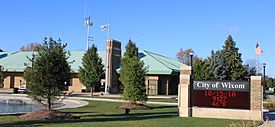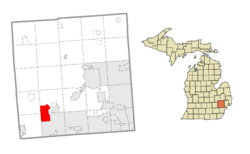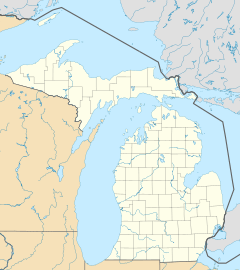Wixom, Michigan facts for kids
Quick facts for kids
Wixom, Michigan
|
|
|---|---|
| City of Wixom | |

Wixom City Offices along Pontiac Trail
|
|

Location within Oakland County
|
|
| Country | United States |
| State | Michigan |
| County | Oakland |
| Settled | 1831 |
| Platted | 1871 |
| Incorporated | 1957 (village) 1958 (city) |
| Government | |
| • Type | Mayor–council |
| Area | |
| • City | 9.36 sq mi (24.23 km2) |
| • Land | 9.14 sq mi (23.67 km2) |
| • Water | 0.22 sq mi (0.57 km2) |
| Elevation | 928 ft (283 m) |
| Population
(2020)
|
|
| • City | 17,193 |
| • Density | 1,881.48/sq mi (726.47/km2) |
| • Metro | 4,296,250 (Metro Detroit) |
| Time zone | UTC−5 (EST) |
| • Summer (DST) | UTC−4 (EDT) |
| ZIP code(s) |
48393
|
| Area code | 248 |
| FIPS code | 26-88140 |
| GNIS ID | 1616671 |
Wixom is a city located in Oakland County, Michigan, in the United States. It is a suburb northwest of Detroit, about 30 miles (48 km) from downtown Detroit. In 2020, the city had a population of 17,193 people.
Wixom was once home to the Wixom Assembly Plant, a large car factory that operated from 1957 to 2007. Today, many different companies have their production and manufacturing businesses in Wixom. These include Trijicon, Discraft, NGK, Rockwell Medical, and Majic Window.
Contents
History of Wixom
Early Settlement and Naming
The area that is now Wixom was first settled in 1831. It was initially called Sibley's Corners. This name came from Alonzo Sibley, who was only 20 years old when he became the first settler. He bought land in what is now Commerce Township.
Over time, Alonzo Sibley bought more land. In 1837, he gave some of his property for a local cemetery. This cemetery was first called South Commerce Burial Ground. Later, its name was changed to Wixom Cemetery. Sibley also became the president of the cemetery association.
Railroad and Growth
Wixom officially began to grow in 1871. This happened when Willard Clark Wixom allowed a railroad to be built through his land. Willard was the son of Ahijah C. Wixom and Lucy Clark. He created a plan for land on both sides of the railroad. This area was near the borders of Novi and Commerce Township.
In 1883, Willard opened his property for an important railroad junction. This allowed the Michigan Airline Railroad to connect with the Grand Trunk Western Railroad. With this new connection, Willard placed the railroad station and mail drop at the center of his property. This new railroad hub attracted many new businesses. Stores, a lumber yard, and a cider mill opened. This helped the small village become Michigan's largest grain handling spot. Because of Willard's efforts, the town's name changed from Sibley's Corners to Wixom.
Becoming a City
Wixom became an official village in the 1950s. This happened after plans were announced to build the Wixom Assembly Plant in Novi Township. Before this, Wixom was not officially a village or city. Its village borders included parts of both Novi and Commerce Townships.
Later, the rest of Novi Township also wanted to become a village. This led the newly formed village of Wixom to become a city. The city's borders mostly followed the village's original lines. However, a small park area to the north was added from Commerce Township in the 1970s.
City Government
Wixom is run by a Mayor-council system. This means there is a Mayor and a City Council who make decisions for the city. The city also has a City Manager who helps run daily operations.
Local Representatives
Wixom is represented by officials at different levels of government. These include representatives in the U.S. House of Representatives, the Michigan Senate, the Michigan House of Representatives, and the Oakland County Board of Commissioners.
| District | Representative | Party | Since |
|---|---|---|---|
| 11th | Haley Stevens | Democratic | 2019 |
| District | Senator | Party | Since |
|---|---|---|---|
| 23rd | Jim Runestad | Republican | 2019 |
| District | Representative | Party | Since |
|---|---|---|---|
| 49th | Ann Bollin | Republican | 2023 |
| District | Commissioner | Party | Since |
|---|---|---|---|
| 14th | Ajay Raman | Democratic | 2023 |
Downtown Development
Wixom has been working to improve its downtown area. A new main street area was built on Pontiac Trail, near the city offices. This project is called the Wixom Village Center. It cost about $200 million. The Village Center has a walking area, restaurants, and shops.
A housing project called Tribute of Wixom is also part of this development. It will have 600 homes, including condos, townhouses, and single-family houses. Construction on this project started again in 2014 after being paused in 2008.
Wixom Downtown Development Authority (DDA)
The DDA helps fund these downtown improvements. They use a method called Tax Increment Financing (TIF). This means they use the increase in property taxes from new buildings and rising property values in the downtown area. These funds are then invested back into the district.
Current Focus Areas (2024/2025)
- Renton Area Redevelopment: The DDA is working with the city to redevelop city-owned land.
- Branding and Signage: They are creating a new look for Downtown Wixom and planning signs to help people find their way around the city.
- Civic Center Playground: A new playground was built in 2024. The DDA contributed $250,000 to this project.
- West End Commons: The DDA is looking for money to develop this area. They have received funding from Congress and Oakland County.
Recent Projects
- West End Sidewalk Project: In 2023, the sidewalk on the south side of Pontiac Trail was rebuilt. New landscaping was also added.
- Wixom Loop: This trail was built in cooperation with the Parks & Recreation Department.
- Downtown Hanging Baskets: Flower baskets are hung downtown every May.
- The Junction Social District: This is a special area downtown where people can enjoy alcoholic drinks bought from local businesses.
Future Projects
- Pontiac Trail Power Lines & Streetscape: Plans to improve the look of Pontiac Trail.
- Wixom Loop - Trail Walk Activation: More improvements for the walking trail.
- Downtown Public Art Program: Adding art to the downtown area.
- Wixom Road Landscaping: Improving the look of Wixom Road.
- EV Charging Stations: Adding places for electric vehicles to charge.
- Expansion of downtown light posts & flower baskets: More lighting and decorations.
DDA Events & Initiatives
The DDA also helps organize many community events throughout the year:
- Wednesdays in Wixom (January/February)
- Sip n Stroll (March, October)
- Derby Day Races (May)
- Block Party (September)
- Spooktacular Downtown Treat Hunt (October)
- Downtown Dazzle (November/December)
- Candy Cane Lane (December)
They also help fund other city events like Concerts in the Park, Fireworks, and the Tree Lighting Festival. The Wixom DDA relies on volunteers to help with events and other tasks.
Education in Wixom
Most of Wixom is part of the Walled Lake Consolidated Schools district. A small part in the southwest belongs to the South Lyon Community School District. Another small area in southern Wixom is in the Novi Community School District.
Schools within City Limits
Schools located directly in Wixom include:
- Loon Lake Elementary School
- Wixom Elementary School
- Sarah Banks Middle School
- Wixom Christian School
- The Walled Lake district's Twin Sun Preschool
Public School Zoning
Students in Wixom attend different schools based on where they live:
- Elementary Schools: Loon Lake, Wixom, Hickory Woods, and Walled Lake Elementary Schools serve Wixom.
- Middle Schools: Most students go to Banks Middle School, while a small number go to Geisler Middle School.
- High Schools: Most residents attend Walled Lake Western High School. Some parts of the city are zoned for Walled Lake Central High School.
For the part of Wixom in the South Lyon district, students attend Dolsen Elementary School, Centennial Middle School, and South Lyon East High School.
Private Schools
St. Catherine of Siena Academy, a Catholic school, is located in Wixom. The Roman Catholic Archdiocese of Detroit oversees Catholic schools in the area. St. William Catholic School, a K-8 school, is in Walled Lake and serves students from Wixom.
Religion
Many different religious groups have places of worship in the Wixom area. St. William Church in Walled Lake serves the Wixom community. There are also many people in Wixom who do not follow any specific belief system.
Media
The studios for WTVS, which is Detroit Public Television, are located in Wixom. They are in the Riley Broadcast Center and HD Studios.
Police and Fire Services
Wixom Police Department
The police station is in the new downtown area on Pontiac Trail. The Wixom Police Department started on October 14, 1957. Before 1958, the Oakland County Sheriff's Department provided police services to Wixom.
In 1996, two Wixom police officers, Gary Hamlin and Martin Harp, showed great bravery. They helped capture a person involved in a serious incident at the Ford plant. For their courage, they received awards and honors, including thanks from the state legislature. They also received the TOP COPS award from the National Association of Police Organizations at a ceremony in the White House, presented by President Bill Clinton.
Wixom Fire Department
Wixom is protected by Fire Station #1, located on North Wixom Road. The Wixom Fire Department has a mix of full-time, paid on-call, and auxiliary firefighters. It also has a full-time fire chief, fire marshal, and an EMS coordinator. The Wixom Firefighters are part of the Michigan Association of Fire Fighters.
The Wixom Firefighters hold an annual Breakfast with Santa event. They also collect non-perishable food items. Each year, they typically collect over 1,500 pounds of food, which is donated to local food banks.
Geography
The United States Census Bureau states that Wixom has a total area of 9.37 square miles (24.27 square kilometers). Of this, 9.15 square miles (23.70 square kilometers) is land, and 0.21 square miles (0.54 square kilometers) is water.
Population Information
Wixom's population has grown steadily over the years.
| Historical population | |||
|---|---|---|---|
| Census | Pop. | %± | |
| 1960 | 1,531 | — | |
| 1970 | 2,010 | 31.3% | |
| 1980 | 6,705 | 233.6% | |
| 1990 | 8,550 | 27.5% | |
| 2000 | 13,263 | 55.1% | |
| 2010 | 13,498 | 1.8% | |
| 2020 | 17,193 | 27.4% | |
| U.S. Decennial Census | |||
2010 Census Details
In 2010, Wixom had 13,498 people living in 5,725 households. About 33.6% of households had children under 18. The average household had 2.36 people. The average age in the city was 34.8 years. About 25.4% of residents were under 18.
The racial makeup of the city was mostly White (79.8%). Other groups included African American (11.1%), Asian (4.9%), and Hispanic or Latino (5.1%).
2000 Census Details
In 2000, the city's population was 13,263 people in 5,889 households. The average household size was 2.24 people. The median age was 30 years old. About 24.9% of the population was under 18.
The median income for a household in Wixom was $44,320. For families, the median income was $64,918. About 5.4% of the population lived below the poverty line.
See also
 In Spanish: Wixom para niños
In Spanish: Wixom para niños


